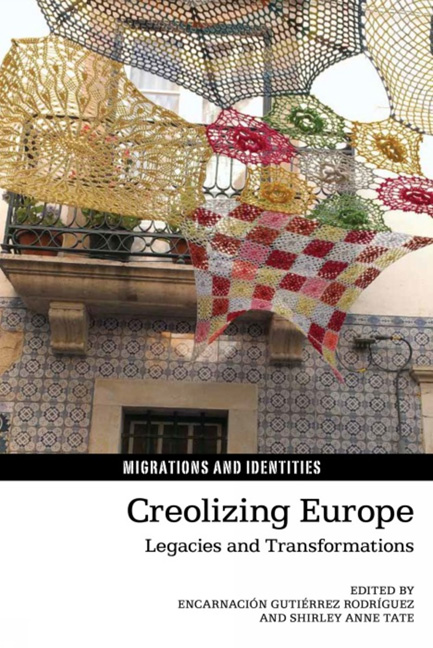Book contents
- Frontmatter
- Dedication
- Acknowledgements
- Contents
- List of Figures
- List of Contributors
- Introduction: Creolizing Europe: Legacies and Transformations
- 1 Creolité and the Process of Creolization
- 2 World Systems and the Creole, Rethought
- 3 Creolization and Resistance
- 4 Continental Creolization: French Exclusion through a Glissantian Prism
- 5 Archipelago Europe: On Creolizing Conviviality
- 6 Are We All Creoles? ‘Sable-Saffron’ Venus, Rachel Christie and Aesthetic Creolization
- 7 Re-imagining Manchester as a Queer and Haptic Brown Atlantic Space
- 8 Queering Diaspora Space, Creolizing Counter-Publics: On British South Asian Gay and Bisexual Men's Negotiations of Sexuality, Intimacy and Marriage
- 9 On Being Portuguese: Luso-tropicalism, Migrations and the Politics of Citizenship
- 10 Comics, Dolls and the Disavowal of Racism: Learning from Mexican Mestizaje
- 11 Creolizing Citizenship? Migrant Women from Turkey as Subjects of Agency
- Index
8 - Queering Diaspora Space, Creolizing Counter-Publics: On British South Asian Gay and Bisexual Men's Negotiations of Sexuality, Intimacy and Marriage
- Frontmatter
- Dedication
- Acknowledgements
- Contents
- List of Figures
- List of Contributors
- Introduction: Creolizing Europe: Legacies and Transformations
- 1 Creolité and the Process of Creolization
- 2 World Systems and the Creole, Rethought
- 3 Creolization and Resistance
- 4 Continental Creolization: French Exclusion through a Glissantian Prism
- 5 Archipelago Europe: On Creolizing Conviviality
- 6 Are We All Creoles? ‘Sable-Saffron’ Venus, Rachel Christie and Aesthetic Creolization
- 7 Re-imagining Manchester as a Queer and Haptic Brown Atlantic Space
- 8 Queering Diaspora Space, Creolizing Counter-Publics: On British South Asian Gay and Bisexual Men's Negotiations of Sexuality, Intimacy and Marriage
- 9 On Being Portuguese: Luso-tropicalism, Migrations and the Politics of Citizenship
- 10 Comics, Dolls and the Disavowal of Racism: Learning from Mexican Mestizaje
- 11 Creolizing Citizenship? Migrant Women from Turkey as Subjects of Agency
- Index
Summary
Culture is the precaution of those who claim to think thought but who steer clear of its chaotic journey. Evolving cultures infer Relation, the overstepping that grounds their unity-diversity.
Édouard Glissant, Poetic Intention (2010), p. 1Glissant's notion of creolization seems one of the most interesting and successful attempts at moving beyond the binary model of thinking so engrained in the ways we perceive the world.
Fatima El-Tayeb, European Others: Queering Ethnicity inPostnational Europe (2011), p. 172Introduction
In this chapter, I deploy a queer diaspora framework, public sphere theory and a creolization perspective to understand the narratives and opinions of British South Asian gay and bisexual men on key queer tropes of sexuality, intimacy, non-monogamy and marriage. The recent increase in cultural, social and political organizing among British South Asian lesbian, gay male, bisexual, transgender and queer people, I argue, results in the formation of discursive spaces that allow for the articulation of complex narratives on intimacy, sexuality, cultural or religious values and citizenship that creolize queer thought and politics. I conceive these spaces as part of a larger process towards the formation of queer diasporic counter-publics. A creolization perspective is helpful for refining diaspora theory, because it endorses a rhizomatic understanding of connection, privileges ‘routes’ over ‘roots’ and avoids categorical rigidity and singularity, which have been common features of certain multicultural orthodoxies (Glissant, 2010b). Creolization focuses on multiple ‘point(s) of entanglement’, which allows for the conception of inter-related and ‘situational’ communities. It highlights frictions, but does not resolve tension into ready-made assumptions of ‘possible’ or ‘impossible’ identities (El-Tayeb, 2011, 172).
The chapter will first develop a queer diaspora framework as a conceptual tool for reading respondents’ comments on sexuality and sexual politics. Diaspora theory has frequently advocated hybridity as the concept most suitable for interpreting processes of cultural mixing. I argue here that creolization is a preferable alternative, because it avoids some of the shortcomings of the hybridity model. This is then followed by an argument that a dialogue between diaspora and public sphere theories can be helpful for understanding British South Asian gay and bisexual men's ideas on relationality.
- Type
- Chapter
- Information
- Creolizing EuropeLegacies and Transformations, pp. 133 - 156Publisher: Liverpool University PressPrint publication year: 2015



